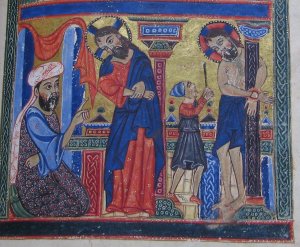Presented By: Center for Armenian Studies
ASP Lecture
The Ever-Wandering Stranger: Community Formation and Cosmopolitan Poetics in Middle Armenian Literature

Michael Pifer, Manoogian Simone Foundation Post-doctoral Fellow, U-M
The trope of the wandering stranger, the outcast with secret prestige, can be found in premodern literatures around the world, from the Odyssey of Homer to the Prose Edda of Snorri Sturluson. East of Europe, while Dante Alighieri was busy composing his famous lines on exile, a remarkable number of Arabic, Persian, Turkish, and Armenian speakers were also writing poetry about a restless outcast of their own: the gharib. This stranger traversed not only geographic frontiers, but also linguistic and literary ones, moving beyond the orbit of Arabic and Persian and going native in Turkish and Armenian poetry by the 14th century. However, despite the ubiquity of the gharib across multiple premodern literatures, contemporary scholarship has devoted relatively little attention to this figure. This lecture asks how and why Armenians came to adapt a vast and multilingual discourse on strangers, rooted in the figure of the gharib, which spanned from the western Mediterranean to the Indian subcontinent. In tracing the gharib’s peregrinations across premodern Anatolia in particular, this lecture ultimately seeks to address a much larger question: how and why literary conventions traveled beyond the orbit of any single language before our own globally interconnected age.
The trope of the wandering stranger, the outcast with secret prestige, can be found in premodern literatures around the world, from the Odyssey of Homer to the Prose Edda of Snorri Sturluson. East of Europe, while Dante Alighieri was busy composing his famous lines on exile, a remarkable number of Arabic, Persian, Turkish, and Armenian speakers were also writing poetry about a restless outcast of their own: the gharib. This stranger traversed not only geographic frontiers, but also linguistic and literary ones, moving beyond the orbit of Arabic and Persian and going native in Turkish and Armenian poetry by the 14th century. However, despite the ubiquity of the gharib across multiple premodern literatures, contemporary scholarship has devoted relatively little attention to this figure. This lecture asks how and why Armenians came to adapt a vast and multilingual discourse on strangers, rooted in the figure of the gharib, which spanned from the western Mediterranean to the Indian subcontinent. In tracing the gharib’s peregrinations across premodern Anatolia in particular, this lecture ultimately seeks to address a much larger question: how and why literary conventions traveled beyond the orbit of any single language before our own globally interconnected age.
Explore Similar Events
-
Loading Similar Events...
